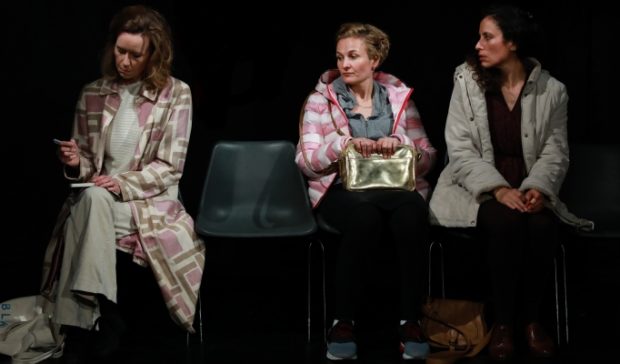You have no items in your cart. Want to get some nice things?
Go shopping
The premise is gripping and timely. Somewhere in London, an entire classroom of fifteen-year-olds is suddenly and mysteriously taken ill. Two, then three mothers sit anxiously together in a hospital waiting room, speculating in the absence of any real information about what happened. Could it be a chemical attack? Anthrax? Asbestos? The police arrive. The mothers are still not briefed. The tension rises.
Félicité Du Jeu, an actress and graduate of LAMDA, grew up in Paris in a multi-cultural household and has been living in England for the past twenty years. After witnessing segregation and tribalism at the school gates, she decided to write a play about “what mothers have in common rather than focus on their differences.”
Spiked throws three unlikely women together in a cramped waiting room. Joanna (Charlotte Asprey) is an entitled wife blessed with a nice and uneventful enough life – a life sufficiently nice and uneventful that she can afford to be neurotic about her daughter’s asthma and self-centred and righteous about her fear, as if she felt more somehow than the other afflicted mothers. Karen (Daniella Dessa) is a working-class single mother who’s had it hard enough that she knows how to brace herself for bad news. Rozhin (Katie Clark) is a Kurdish immigrant who bites her fingers with anxiety but keeps her pleasant manner with the hesitancy of the guest, not sure how to handle her hosts under the circumstances.
Joanna, Karen and Rozhin are well drawn characters and they all sound true. The problems begin when they interact with each other. Instead of using their backgrounds as springboards to reach their inner selves – to shed light on who they are as humans beyond their circumstances – the dialogue remains trapped in stereotypes. Rozhin explains to Karen that she did not “move here to take anything from her but to have a better life” and she exhorts her son Hemin to be “proud” of his Kurdish heritage. It’s too generic. Rozhin only rises above being a mouthpiece for all immigrants everywhere at the end of the play when she discovers social media.
Meanwhile, the animosity between Joanna and Karen has no other apparent cause than their class differences. When Joanna finally has a specific reason to criticise Karen, her arguments remain – to use the word again – generic. So much so that it got me thinking that, as types go, their heated discussion was more reminiscent of a French altercation than a British one – where the tendency, especially in middle-class circles, is not to be confrontational.
Diversity in London schools is a big topic. According to the Guardian, in 2012 70% of primary school pupils in Tower Hamlets had a first language that was not English. In Brent, the percentage of non-white pupils in secondary school was 94.5%. Du Jeu is right. The path to integration goes through the mothers and their finding a common ground no matter where they come from. The end of the play is beautiful, with a video of feathers fluttering in the background of Cecilie Gravesen’s otherwise sober set while we listened to a recording of the answers Du Jeu received when she asked dozens of mothers what they wanted for their children. The same words kept coming back: happiness, happiness, health and peace.
Spiked continues at the Pleasance Theatre until April 28th.
About Isabelle Dupuy
Isabelle Dupuy is a writer based in London. She is currently working on a novel "Living the Dream"





Very expressive descriptipn of the caracters. The interaction between these different types of women seems very credible. Thumb up Isabelle ?
I want to see it now! It is very true that the school gates are a gathering of increasingly more different women who connect on a deeper level than their passports, whether they like each other or not.
Would love to see it. Isabelle your “ generic” comment made me want to see how Du Jeu presented these 3 mothers. They are worried mothers first!